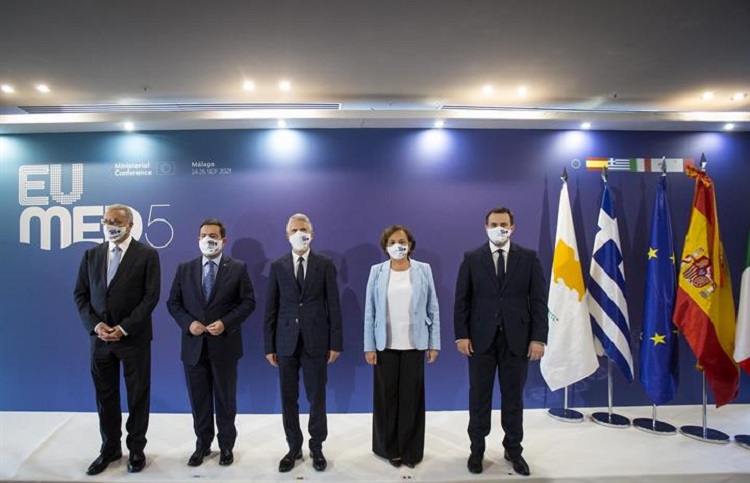The Diplomat
The Interior and Migration ministers of Spain, Italy, Greece, Cyprus and Malta, meeting yesterday in Malaga, agreed to call on the European Union to ensure that the common migration policy revolves around the equitable distribution of responsibility among member states, with prevention at source as a priority and adequate financial instruments.
This was stated in the joint declaration signed by the Minister of the Interior, Fernando Grande-Marlaska, and his counterparts from Italy, Luciana Lamorgese; Greece, Notis Mitarachi (Minister of Immigration and Asylum Policy); Cyprus, Nikos Nouris; and Malta, Byron Camilleri, at a meeting of the MED5 group. The aim of the meeting was to strengthen the common position of the five Mediterranean countries in the negotiations for the future European Pact on Migration and Asylum.
The five ministers point out as a starting point in the joint declaration that any EU policy aiming at “effective management of asylum and migration” must take into account the experience of “the Member States at the most exposed external border of the European Union”.
“Our voice and our vision of the migratory challenge must not only be taken into account, but must be central to European policy,” said Grande-Marlaska, adding. “Migration is not a temporary challenge, but a structural one, and it needs medium and long-term solutions and permanent and lasting methods. The EU needs a more balanced, fair, realistic and European migration and asylum policy.
Lamorgese, Mitarachi, Nouris, Camilleri and Grande-Marlaska also agreed to insist on the need for the future EU Pact on Migration and Asylum to establish a truly equitable sharing of responsibility between member states on migration issues. “Responsibility must be shared fairly, avoiding imposing an additional burden on Member States already suffering from excessive migratory pressure, while taking on the task of protecting the EU’s external borders,” the joint statement said.
Ministers underline that recent events arising from the situation in Afghanistan or Belarus demonstrate “the importance of relying on effective solidarity to respond to the needs of the Member State concerned”.
As one of the ways to achieve such equitable sharing, the MED5 countries stress the need for “a predictable and compulsory relocation mechanism for those Member States facing disembarkation following Rescue and Rescue operations or other forms of migratory pressure as a result of their geographical situation”.
The joint declaration states that the common migration policy must articulate, as a “fundamental and priority” axis, effective mechanisms for prevention at source. And it warns that “the EU cannot afford to wait for migratory flows to reach its external borders. For this reason, he believes that it is necessary to tackle “humanitarian crises at their origins and by strengthening the appropriate capacities of the countries of origin and transit”, which means “avoiding the dramatic loss of human lives”.
In this respect, Grande-Marlaska pointed out that “the keystone on which to build the EU’s migration policy is cooperation with the countries of origin and transit”.
The five ministers also called for adequate funding mechanisms. “For the prevention of irregular migration to be effective, and given its structural nature, the Union’s migration policy must be adequately funded,” the declaration states.
The text explains that “the Neighbourhood, Development and International Cooperation Instrument (NCICII), which is intended to be the main financial instrument in our efforts to address the root causes of irregular migration, must be made operational as a matter of priority”.
The meeting was a continuation of the summit held last March in Athens, as well as of the various telematic meetings that the five interior ministers have been holding in recent months, the aim of which is to defend the common position of these countries of first entry of migration in the framework of the negotiations for a new European Pact on Migration and Asylum.






